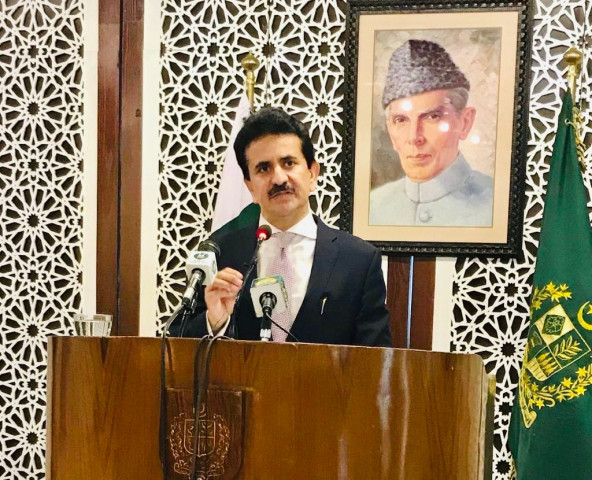No policy shift on Israel under consideration: FO
FO says PM Imran made clear Pakistan will not recognise Israel until Palestinians given right to self-determination

Pakistan on Thursday categorically stated that it was not considering recognising Israel after the United Arab Emirates (UAE) recently signed a landmark deal with Tel Aviv to establish diplomatic ties with the Jewish state.
“On Pakistan’s recognition of Israel, let me reiterate that the recognition of Israel by Pakistan is not under consideration,” Zahid Hafeez Chaudhri, the recently appointed spokesperson of the foreign ministry, said in his maiden press briefing.
Prime Minister Imran Khan had already stated that Pakistan would not recognise Israel until Palestinians were given their right to self-determination and freedom.
Speculations were rife that Pakistan might seek a shift in its decades-old policy after the UAE agreed to establish diplomatic ties with Israel, becoming the third Arab country and first from the Gulf region to normalise ties with Tel Aviv.
Pakistan’s reaction to the UAE-Israel deal was cautious as it neither criticised nor condemned the agreement, leading to speculations that Islamabad might be revisiting its strategy.
Palestine praises PM Imran's remarks over UAE-Israel deal
What added to the confusion was omission by the Foreign Office in its official handout about the withdrawal to pre-1967 borders with Al-Quds Al-Sharif as capital of Palestine.
But on Thursday, the spokesperson clarified that for a just “comprehensive and lasting peace, Pakistan has consistently supported a two-state solution in accordance with the relevant United Nations and OIC resolutions as well as international law, with pre-1967 borders and Al-Quds Al-Sharif as the capital of Palestine”.
“The Foreign Office has already issued a clear statement on its position on the Middle East peace process and on Pakistan’s position on the Palestine issue,” he said. “Peace and stability in the Middle East region remains Pakistan’s key priority. There is no change in Pakistan’s principled position on Palestine.”
He said that Pakistan had an abiding commitment to the full realisation of the legitimate rights of the Palestinian people, including the right to self-determination.
On relations with Saudi Arabia, he said Pakistan and Saudi Arabia had always enjoyed unique relations deep rooted in historic, religious, cultural and social ties.
“The two countries have strong economic, political, security and military cooperation at all levels. Relations between the two brotherly countries have continued to grow over time.
“Pakistan and Saudi Arabia have not only closely cooperated with each other at international fora but have always stood by each other in times of need. Pakistan values Saudi Arabia’s important role in the OIC Contact Group on Jammu and Kashmir. Pakistan has an abiding commitment to defending the sanctity of Harmain Sharifain. Pakistan remains firmly committed to the sovereignty and the territorial integrity of Saudi Arabia.
“The people of Pakistan have special reverence and affection for the Custodian of the Two Holy Mosques [Khadim ul Harmain Sharifain].”
He said that the frequent high-level visits and close leadership-level contacts had been the longstanding tradition of the brotherly relations between the two countries. “The visits by Prime Minister Imran Khan and the landmark visit of Crown Prince Muhammad Bin Salman in February 2019 have further cemented our relations and provided new avenues of cooperation in trade, investment and other fields,” he pointed out.
“The long-term strategic relationship between the two brotherly countries is time tested and will continue to grow to our mutual benefit.”
Premier Imran’s remarks on the issue in his recent media engagement and COAS Gen Qamar Javed Bajwa’s just-concluded visit to Saudi Arabia testify to the unchanged fraternal relations and close contact between the two brotherly countries, the spokesperson said.
“As for General Raheel Sharif’s position, there is no change in that and there is no rift in Pakistan-Saudi Arabia relations that could lead to any such situation.”
As for divisions within the OIC, the spokesperson said that Pakistan remained committed to the unity of the Ummah and had always worked towards that end. Pakistan will continue its efforts to keep the Muslims united.
On the OIC’s role, he said that the 57-member body had indeed played an important role in the context of the Jammu and Kashmir dispute, adding that it had established a Contact Group on Jammu and Kashmir and has also appointed a special envoy of the secretary general on the Jammu and Kashmir dispute.
The Contact Group on Jammu and Kashmir has held four meetings so far since India’s illegal and unilateral actions of August 5, 2019. Three of those meetings were held at the foreign ministers’ level.
The OIC has also passed a number of resolutions, condemning Indian actions and continuing human rights violations in IIOJK.
The resolutions have also called for a just resolution of the Jammu and Kashmir dispute in accordance with the United Nations Security Council Resolutions.
On the foreign minister’s visit to China, he said that the level foreign minister’s visit to China is not linked to Pakistan’s relations with Saudi Arabia. “It is a part of our continued strategic engagement with China. The foreign minister is leading the Pakistani delegation to the Second Round of the China-Pakistan Foreign Ministers’ Strategic Dialogue.”


1724319076-0/Untitled-design-(5)1724319076-0-208x130.webp)
















COMMENTS
Comments are moderated and generally will be posted if they are on-topic and not abusive.
For more information, please see our Comments FAQ